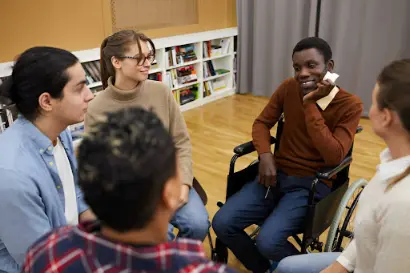Are you or someone you care about getting help from the NDIS and want to know what “capacity building” means? If that’s the case, you’re not the only one. A lot of people who are trying to understand the National Disability Insurance Scheme (NDIS) get lost when they see words like “Capacity Building Supports.” One of the most important things that the NDIS pays for is daily care and specific treatments. On the other hand, capacity-building tools serve a specific purpose. These supports do not meet immediate needs. Instead, they’re meant to help people learn new skills, become more independent, and work towards long-term goals. It’s an investment in the growth and future of the person who takes part, whether they’re learning how to manage their money, getting better at public speaking, or building up their courage to join in with community activities.
Understanding Capacity Building NDIS
So, what does “capacity building NDIS” mean, and why is it such an important part of your plan? Under the NDIS, “capacity building” refers to a set of paid supports that help individuals improve their skills and abilities. Capacity-building supports are more about the future than core supports, which focus on daily tasks like getting dressed, eating, or moving around. They are meant to give people the skills and confidence they need to live more independent, self-directed lives. A person might get money to see an occupational therapist to improve their daily living skills, or they might be able to access training programmes that help them with things like making friends, getting involved in the community, or even getting a job.
Capacity building NDIS usually has its budget in each plan. This budget is split into groups that correspond to different outcomes, like schooling, work, health, relationships, and housing. This lets people personalise their support and tasks to meet their own goals. It’s all about teaching people the skills and tools they need to handle life on their own, without needing help from others.
What Does Capacity Building NDIS Actually Include?
Building up capacity, there are different types of NDIS services that are based on different parts of a participant’s life. Some of these are better daily living, better relationships, more social and community participation, and more. Each group serves a different purpose, and funds generally can’t be moved from one to another. That is, if you get money for “Improved Employment,” you can’t use it for treatments under “Improved Health and Wellbeing.”
Let’s say someone wants to learn how to cook their food. So, their plan could pay for a physical worker to help them learn how to be safe in the kitchen. Another possibility is that a person is lonely and wants to join in group activities. Capacity building increases social and community participation in the NDIS. The NDIS’s capacity-building supports aren’t just for the present; they’re also meant to give people the tools they need to live the life they want.
NDIS Capacity Building Supports Examples
To show how these supports work in real life, here are some capacity-building NDIS examples:
- Improved Daily Living: An individual may receive occupational therapy to learn important skills such as cooking, which enables them to successfully prepare meals on their own.
- Increased Social and Community Participation: Funding could help people get into group activities like art classes or team sports, which would help them meet new people and feel like they fit in their community more.
- Improved Job Opportunities: To help people get good jobs, supports may include job coaching or workshops on how to write resumes and do well in interviews.
- Improved Relationships: People can get help from behavioural treatment to improve their speaking skills, which can lead to better, healthier relationships.
As you can see, the Capacity Building Supports NDIS can be tailored to meet the specific needs of each participant. This helps them become more independent, fit in, and grow as a person.
What Is NDIS Capacity Building Improved Daily Living?
This group is likely one of the most important and widely used. Supports that help people become more independent in their daily lives are part of the NDIS capacity building for improved daily living. It includes tests and training given by related health workers like occupational therapists, speech pathologists, physiotherapists, and psychologists.
These professionals figure out what the person can do and then help them get better at important life skills. A speech therapist, for instance, might help a person with a communication problem learn how to better explain themselves. An occupational therapist, on the other hand, might teach a participant how to safely cook food or use public transportation.
One of the most powerful parts of the NDIS is that it tries to cut down on long-term dependence by giving people more skills and confidence.
NDIS Capacity Building Activities and Real-Life Impact
So what exactly are NDIS capacity-building activities? These are different for each person, but they all have the same goal: to help the individual handle different parts of their life better. Some of these are therapy, programmes that help people get ready for work, classes on planning and money management, joining community groups, going to school, mentoring, and learning life skills.
For example, let’s say a young adult with a brain condition wants to live on their own one day. With the help of NDIS capacity-building support, they could learn how to make easy meals, do cleaning, keep track of their time, and make a budget. Over time, these small steps add up to bigger, more important results, such as living on your own, getting a job, and making connections with others that matter.
The best part? Not only are these things useful, but they’re also often fun and good for your social life.
The Importance of Understanding Your Capacity Building NDIS Code
It is possible for NDIS service providers and plan managers to collect funds through the NDIS. Each area of the capacity-building NDIS has its own line item and capacity-building NDIS code. For example, therapy services for daily living might be coded differently than events that get people involved in their communities. If you’re a participant, you might not have to deal with these rules directly. However, families, carers, and support managers should be aware of them so that there are no problems with funds or poor management.
If you know the numbers, you can make sure that you claim the right services under the right groups. This will help your plan work better for you.
Conclusion:
In conclusion, one of the most important parts of an NDIS participant’s plan is improving their skills. It changes the goal from just living to getting better, growing, and becoming independent. Capital Building Supports give people the tools and direction they need to reach their goals, whether those goals are to live on their own, make friends, get a job, or just feel more confidence in their daily lives.
If you know the types, cases, and goals of these supports, you can better speak up for yourself or someone you care about. Don’t forget that NDIS isn’t just about getting you what you need right now; it’s also about getting you ready for a better, stronger tomorrow.




No comment yet, add your voice below!